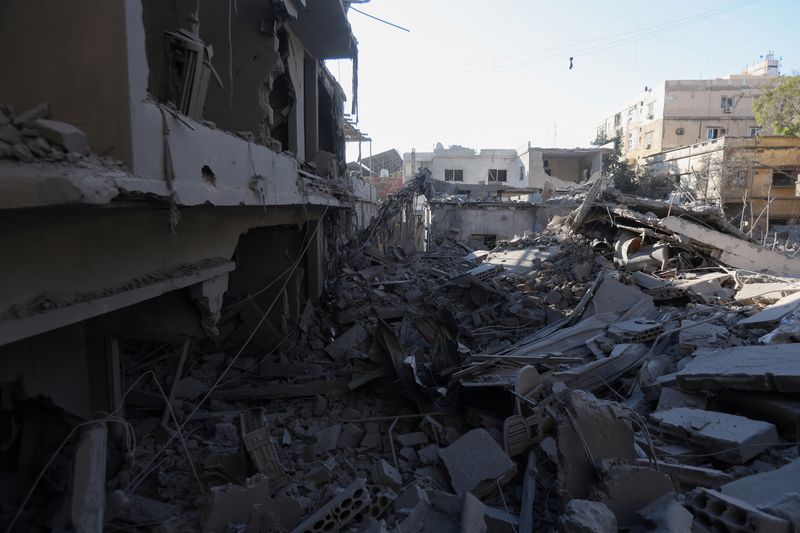Israeli airstrikes turn Lebanon’s Tyre into ghost town
2024.10.24 12:10
By Amina Ismail
TYRE, Lebanon (Reuters) – Thunderous booms followed by black columns of smoke in the sky, ancient ruins with no tourists, and a seashore without fishermen or beach-goers.
War has turned Lebanon’s idyllic port city of Tyre into a ghost town.
Tyre had been considered safe for much of the year in which Lebanese armed group Hezbollah and Israel had been exchanging fire. But Israeli airstrikes this week led to fears that nowhere in Lebanon would be safe.
Near one of the three residential blocks reduced to rubble on Wednesday, a family loaded belongings into a car parked amid broken glass and debris. Eight mattresses were stacked on the car roof, secured with rope.
The raids had torn the facades off surrounding structures, exposing bathroom pipes and entire kitchens to the outdoors. Personal belongings were scattered everywhere – shoes, photographs, toys and clothes.
Tyre’s picturesque beaches were empty. Just last month, conservationists were helping endangered sea turtles lay eggs along the coastline but since then, Israel’s military warned against maritime activities, saying they could be targeted.
Khalil Ali, a 59-year-old fisherman, sits on a jetty and throws a fishing line hopelessly into the sea.
“We are very worried,” he said. “The situation might be like Gaza, and that Israel issues more evacuation orders that will force me to leave my hometown. It was not like this in 2006, this is very difficult. They did not destroy this much.”
More than 2,500 people have been killed by Israel’s offensive in Lebanon, and over 1.2 million have been forced from their homes, according to Lebanese authorities.
Tyre mayor Hassan Dabouq told Reuters only a quarter of the city’s residents remained, and many feared the destruction that had been wrought on the Palestinian enclave of Gaza was coming for them, too.
“It’s the same people, the same war, the same mentality, and the same (Israeli) officials, with the same support from the Americans and Europeans. The elements are the same, so why would it be any different in Lebanon?” Dabouq said.
At Tyre’s port, dozens of vessels were docked on Wednesday morning. This area would normally be bustling with activity as fishermen brought in their catch to sell to merchants but now is eerily quiet. A few fishermen were present, not to fish, but to check on their boats.
Shops and restaurants were closed, and the fridges that once held fresh fish were empty and turned off.
VICIOUS WAR
Only those with nowhere else to go and those who felt a sense of duty to stay remained. One Tyre resident said she would rather stay in her hometown than die as a refugee.
Wael Mroueh, a 49-year-old nephrologist and director of the Jabal Amel Hospital, chose to stay. His hospital is one of only three still serving southern Lebanon.
Having lived through numerous wars, Mroueh remembers a childhood of bombings, explosions and destruction.
Determined not to subject his three children and loved ones to the same horrors, he made the decision to send them to safety further north while he remained behind.
“I fear I might never see them again because of this vicious war being waged against us,” he told Reuters at his hospital, covering his face as he broke down in tears.
Mattresses and personal belongings lay in hospital corridors. To convince some of his staff to stay on, Mroueh had allowed them to live there with their families.
Like the city itself, only a quarter of the hospital’s doctors had stayed. Just over one-third of the nurses did too.
Dressed in his white scrubs, Mroueh toured the ICU and the kidney dialysis unit to check on about 30 patients injured in the war, many of whom had serious injuries and were unconscious.
He sends patients who are stable enough for transfer to Beirut every day but as the conflict drags on, he is bracing himself – and preparing the hospital – for the worst.
He said there are troubling patterns in Israel’s actions in Lebanon that were similar to Gaza, particularly concerning the targeting of aid workers, medics, and hospitals.
Lebanon says 13 of its hospitals and more than 100 other health facilities have been put out of service by Israel’s strikes. The World Health Organization says more than 100 medics and rescue workers have been killed in the last year in Lebanon.

Mroueh sees those Israeli strikes as an attempt to strike at morale – but says it has not worn down his sense of responsibility.
“If everyone leaves, there will be no one left,” he said. “This is part of our resistance.”








